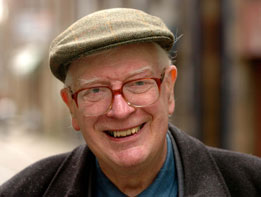
| HOME |
| NERVE |
| REVIEWS |
| ARCHIVE |
| EVENTS |
| LINKS |
| ABOUT US |
| CONTRIBUTORS |
| BACK ISSUES |
| CONTACT US |
Back to index of Nerve 9 - Autumn 2006
 Clash
of Ideals
Clash
of Ideals
In 1983 Militant Labour were swept to power on a wave of reaction to Thatcher's policies and the way that the Liberals were running the City. Colin Serjent speaks to John Hamilton (83), the leader of Liverpool City Council in those turbulent times.
Labour had won control of the council, thanks to a 40% increase in their
vote. But, the power of the newly elected council to implement changes
in Liverpool was severely hindered by the government's refusal to let
councils set their own local rates, which led to such measures as rate-capping.
"Thatcher considered municipal authorities to be wasteful."
says Hamilton. "She did this as a means to cut back what she perceived
as overspending.
"I met her at Liverpool Town Hall, and she asked me what I thought
the reasons were for the riots in Toxteth. I stated that the high unemployment
in Liverpool was the main cause. Her reply was that unemployment was nothing
to do with her.
"My overall impression of her was that she did not want to listen
to anything she did not want to hear."
The council, which was led by supporters of 'Militant Tendency' within
the Labour Party, decided to take on the government. They were determined
to fight back strongly against what they thought were bullying tactics
by Thatcher and her cabinet ministers.
Despite mass marches - numbering up to 50,000 protesters - and several
one-day strikes in Liverpool called by local trade unions in defiance
of Thatcher's oppressive tactics, 47 DLP councillors were dismissed from
office by the Law Lords in 1987 for setting what the government called
an 'illegal budget'. The 47 were also expelled from their party by the
national executive in London, with Labour leader Neil Kinnock being one
of their most vehement opponents.
A Liberal/Conservative alliance took over the running of the council.
"But the people of Liverpool, through ordinary working class people
and the unemployed, supported the Labour group which had gone illegal,"
commented Hamilton. "A new Labour group was elected to the council
in 1987."
Hamilton described his former council deputy Derek Hatton, who must have
seemed like he was the actual leader to a lot of people outside Liverpool.
"He was a firebrand. Tony Mulhearn - who was President of the Liverpool
District Party at that time - was put on the council to control him. In
the end, though, he had to do what Hatton wanted. He could not be controlled
by Militant."
Hamilton believes that Hatton got so much power and influence because
he was brazen in his dealings with people. "You could not argue with
him."
Ever true to his principles, Hamilton last year rejected an award the
city wanted to present to him to mark his civic life.
"I informed the city council that I do not believe in such honours
schemes. I have only accepted one award and that was a medal from the
Duncan Society for work in public housing."
For more information about the 47, visit: www.liverpool47.org